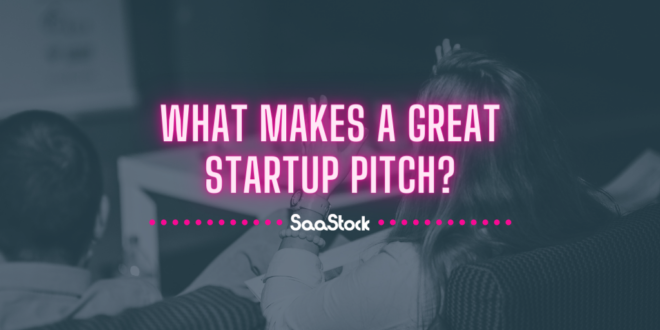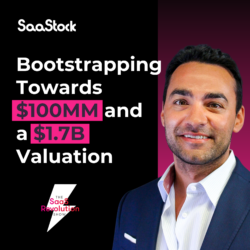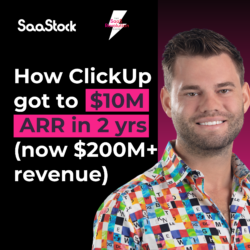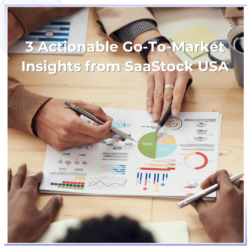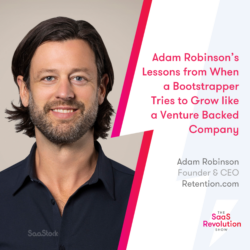If you are not subscribed, join the community by subscribing here and share it with your fellow SaaS enthusiasts.
“We want to understand what the product is solving and that it’s generating the benefit to the customer, but we don’t need to know all the bells and whistles”, said Jennifer Vancini, General Partner at Mighty Capital, on the SaaS Revolution Show podcast.
The key things that your startup pitch should encapsulate:
(These could get your startup to the next meeting and to a due diligence)
- A unique and excited team,
- A differentiated solution,
- Promising financials,
- A credible plan to generate outsized returns.
Listen to the full podcast episode for more tips on how to nail your startup pitch, from Jennifer.👇
Listen now:
You can also read the full transcript of this video below.👇
Transcript
Alex Theuma:
Welcome to the SaaS Revolution Show with Jennifer Vancini, general partner at Mighty Capital. Welcome, Jennifer.
Jennifer Vancini:
Thank you. I’m really excited to be here and appreciate the opportunity to speak to your listeners.
Alex Theuma:
Yeah. No, it’s great to have you on the podcast for the first time, an early morning call. Are you in San Francisco or somewhere on the West Coast?
Jennifer Vancini:
Yes, the Bay Area. Yeah, West Coast.
Alex Theuma:
Welcome. Hopefully, this will be your caffeine hit for the rest of the day. I’ll try to make it energetic as possible. Tell us a little bit about yourself, Jennifer. Who is Jennifer Vancini for those that don’t know?
Jennifer Vancini:
Sure. Happy to. So, as you mentioned, I’m a general partner at Mighty Capital. My background is about 25 years in the tech industry after a stint at Pricewaterhouse and more traditional industries. So I’ve worked primarily with startups or in innovation groups with large companies, about 15 years of which were with multinational companies or international companies. I worked for Telefonica Digital based out of London, for example, working on their digital group within this massive telco. Specific industries where I have deeper expertise include security, mobile, enterprise B2B. I’ve helped take a company public in Canada, ran the European arm of another company, primarily done at a later stage in my career before investing full-time business and corporate development, so doing those blank sheet of paper, strategic deals, making investments, M&A, joint ventures, things to help a company move the needle.
Jennifer Vancini:
After leaving Telefonica, I decided to invest full-time because I understand with my finance background that you have to be diversified. You have to be professional about it. So I started a managed a family office fund. Then, on that journey, ended up meeting my co-partners, co-founders at Mighty Capital. We invested together for a while and then decided to start a fund in 2017.
Alex Theuma:
How did you come up with a name Mighty Capital? I’m curious to know.
Jennifer Vancini:
Yeah. Our managing partner, her name is SC Moatti, and she worked with the branding firm and they, I think, rift off the Moatti and the Mighty Capital. So, it just sounds good. It makes a punch, and we punch higher than our weight.
Alex Theuma:
What sort of companies do you invest in? Any examples of some investments that you’ve made over the last couple of years?
Jennifer Vancini:
Sure. Our investment thesis is mostly centered on early growth, so not the early seed, but early growth, companies with product market fit, some traction in the marketplace, the raising capital now for the next level of growth. We’ve done a couple of later stage things based on our network opportunities, but we’re in companies like in SaaS Amplitude, JourneyApps, Accern. We’re in DigitalOcean. We have a couple personalized medicine plays in genomics, which is a fascinating area, especially when you merge it with big data opportunities to detect diseases, help cure cancer, little things like that.
Alex Theuma:
You’ve worked obviously with, I’d say, a number of large tech companies and obviously Telefonica is a beast of a company as well. What’s it like now as a VC investing in and then working with early stage companies?
Jennifer Vancini:
Yeah. One of the reasons I made the leap is because I like working with early stage companies. I’d been advising them, mentoring them. I have some ties to Canada, so I had been working with the sector up there, which is quite strong, especially in SaaS, actually, and deep tech. So I always liked working with the building phase, I guess, and those phases of growth. Through my years of experience, I have seen that the hurdles and the opportunities. It’s a mix of an art and a science, right? Like a poker game in some ways. So that’s one of the reasons that I really enjoyed getting into this, but it’s a long game. Venture capital is a long game. It takes a long time to make any money out of it. You have a few wins and a lot of burdens on your shoulder on the way, but it’s constantly a learning exercise as well, learning how to be a good partner to the companies, learning about sectors, learning the finer points of investing. It’s quite a complicated area. Yeah.
Alex Theuma:
All that learning and just thinking about that, so are you learning on the job? So you started the fund learning as to be a successful VC, as you said, the many complications, many areas of it. I know that some VCs, they do things like the Kauffman Fellows for two years, that sort of thing. I guess what I’m trying to think of is for anybody that’s listening that might want to become a VC, how do you learn to become a VC?
Jennifer Vancini:
That’s a great question because yes, there are a lot of people that are interested in it. So yeah, my partner is doing the Kauffman Fellows now. You really learn a lot on the job, but having said that, like any other subjects, research it, do your homework, try to learn from the best. There are a couple of books out there, but go to angel events, accelerator events, see the pitches. When you’re new to it, every pitch sounds great. It’s only through hearing 4,000 of them and going through the whole process of due diligence to an investment to the next stage that you really start to see the patterns, the opportunities.
Jennifer Vancini:
We have a number of LPs who are LPs precisely because they wanted to learn about venture. They’ve taken classes in early stage investing. We give some of them the opportunity to do an LPN residence and sit with us for six weeks to see the process so they can understand like, “Is this something I might be interested in someday or do I want to do more direct investments?” So, it really is by jumping into the community, going to all the events, to the extent you want to go to the formal educations, but there are a lot of unknown unknowns when you first get started. It sort of like you look at a bike, you think you can ride it until you get on it. And then you are going to skin your knees a couple times until you really learn the ropes.
Alex Theuma:
Yeah. I mean, speaking of riding a bike, I’m trying to get my daughter to ride a bike at the moment. She’s too scared. She’s too scared. I don’t know if you’ve got any secrets or tips.
Jennifer Vancini:
I have a tip. My daughter was conservative about it. Now, the little kids start on the things without the pedals and they go right to training wheels, have her try it on grass, try riding the bike on grass. They feel safer and it’s slower because of the tire traction. So, just a little tip. That’s how I got over the hurdle.
Alex Theuma:
We’ll give that one a go. I want to go to this year, as an understatement, has been very challenging, very different, obviously, because of the pandemic. How has Mighty Capital’s and your investment process changed in the light of what’s happening in the world?
Jennifer Vancini:
Yeah, I’ve been surprised how little it has. If anything, things have accelerated and gotten extremely busy. We already worked… I mean, I miss maybe seeing my partners in person, of course, but we already had a lot of virtual platforms during virtual screenings and whatnot. So we just had to ramp that up and use it all the time using Slack and Zoom and Airtable and all the tools. We’re definitely on Zoom a lot during the day. So, that leap wasn’t as significant, not as significant as it is for distance learning, for example. That part wasn’t hard. We all took a pause for the first month just to make sure the portfolio companies were healthy. We’re fortunate in that most of ours were. They had done follow-on rounds recently. They had enough cash.
Jennifer Vancini:
I was so proud of our CEO’s, how quickly they addressed this and realized that it was a real crisis. They showed their resilience to where… If some of them had to cut their burn rate, definitely ratchet down their forecast so that they understood and start looking for those opportunities to maybe pivot or tell a story that help them sell in this market or to squeeze resources and something that just wasn’t going to work until we saw through the fog. So there was that for awhile. The deal flow pace has actually picked up quite a bit, maybe because a lot of companies needed to make sure they had 12, 18, 24 months cash on their balance sheets and raise it when they could. But we’ve seen some fantastic companies.
Jennifer Vancini:
We’ve also been able to continue tapping into our network. One of our differentiators is that we have exclusive access to a group called products account. It’s a very large network association for product managers and product experts. And so, we tap into that for deal flow and we help our portfolio companies into that. And so, I think our work with that organization has actually accelerated as a way to help companies get more leverage. I guess maybe it hasn’t changed as much as one would think, because finance investing is a long-term game and it’s just… I’ve seen two downturns before. So, it’s just making a couple tweaks, but always keeping your eye on the long run. Fortunately, for us, we always stuck to fundamentals. Is this a solid business? Did their prior financing makes sense? Were valuation sensitive?
Jennifer Vancini:
I had heard VCs say last year, “We’re not valuation-sensitive.” I don’t get that personally because I don’t know what you think you’re buying, but it’s like the finance has to make sense from the end game to today. Is it a business that actually has an ROI for the customer? So, I think there’s more spotlight on that, on those fundamentals. Are we saving costs for the customer, growing the revenue? What don’t we need to invest in? I think it was just back to basics. There definitely are companies are getting lost in the middle. They didn’t raise enough or they’re between rounds or their revenue didn’t quite get to the next round and they’re going to have trouble raising great companies, great products. We’ll see some dynamics there. But as I said, we were pretty lucky in terms of our portfolio. Many of them have gone on to raise additional capital quite easily to see them through and get to their next levels.
Alex Theuma:
The first wave of the pandemic hit, we saw a lot of investors look to their own existing portfolio companies and doubling back, making sure that they’re okay for the foreseeable. Have you made any new investments? And if so, what was it? You mentioned about some of the fundamentals of businesses, but what was it about these specific companies made you invest some about now?
Jennifer Vancini:
Yeah, we’ve made several. I’ll give you an example. One is a company called Accern AI out of New York. It’s a product within a lot of AI machine learning and its building blocks. They were helping investment banks, asset management firms make investment decisions. We invested in them because they were on the right trajectory. They had very strong customer references. They had a good investor syndicate, which for us is very important. Who you’re investing with and who the CEO and the management team are really critical. They were cost-efficient. They had a reasonable projection model, reasonable burn rate. The team were hustlers. So we invested in them, I want to say June timeframe, after a long discussion. That’s an example of the company that pretty soon, after the pandemic, they found new opportunities for risk management, or that customers were coming to them and saying, “We got to watch the risk management.”
Jennifer Vancini:
So, companies that really basically had found product market fit, especially during COVID had shown that it didn’t affect them as much as one would think, or they were actually growing revenue. Another one we invested in in the life sciences side is called Siren Care. That’s solving a real problem with Neurofabrics and socks, telemonitoring, applications for podiatrists and doctors monitoring their patients to prevent diabetic foot ulcers. So, that’s a massive market. They got Medicare reimbursement codes, which is a pot of gold in the U.S., a really critical milestone of growth for certain companies. And so, solid management team, solid technology, strong customer demand, really great investors syndicate. Yeah. We’ve found really fantastic opportunities in the last few months. The deal terms changed overall in the industry, although they’re starting to go back to the old… We’re starting to see valuations go up into hard to justify realms once again. I don’t expect that to hold personally, but we’ll see what happens.
Alex Theuma:
How did you find, let’s say, the first opportunity, the AI company from New York? Was this through product network that you’re a part of? Did they cold email you? Or is it through LinkedIn? Or is it through [inaudible 00:14:32]?
Jennifer Vancini:
Where did they come from? But most of our deals come from quite honestly, even though we look at 4,000 opportunities a year, meet in person or on Zoom with 400, deals we actually invest in, the majority come from our partners, products account, other VCs. We co-invest with other VCs. They see the value we’re bringing, especially with the products account story. The CEO sees that and wants us on the cap table for the value add. Accern, I think one of our partners saw them at an event. And then one of our LPs, who is like fund-to-fund LP, had also been looking at them. So we were able to compare notes. And then when we were still in early discussions, they attended a products account executive seminar in New York, and their eyes went wide open when they saw some of their target client lists at the event. And so, that really accelerated the investment opportunity for us.
Alex Theuma:
What do the companies that you invest in, or the best companies that I guess pitch to you over Zoom or in person in the good old days, what do the best ones do that really gets your attention?
Jennifer Vancini:
Yeah. It’s hard to do obviously. We actually have on our website somewhere at the profile of a great deal. And so, that shows the key things we’re looking for in your 12 to 15-slide pitch that could get it to the next meeting and to a due diligence. We’re looking for a unique team that’s excited to solve a big and hard problem. They’ve come up with a differentiated solution and are getting solid traction, which they could monetize fairly, so proving out the business model. The financials look promising, but they do need funding to get to the next level. They show that they have a credible plan ultimately to generate outsized returns to investors. Because at the end of the day, it is evaluating the financial opportunity and how that fits within our portfolio for our goals to return capital to our limited partners and meet the risk return or minimize risk as much as possible for an outsized return.
Jennifer Vancini:
So if you can tell a story that ticks those boxes or looks like it might tick those boxes, you’re much more likely to get the next meeting. What we’re not looking for are deep dives into the product. I mean, we want to understand what the product is solving and that it’s generating the benefit to the customer, but we don’t need to know all the bells and whistles. We usually don’t want to even see a demo unless it’s something very easy to hold up and show. Yeah.
Alex Theuma:
It’s important that the startup, the founders are a good match with the VC firm that they’re asking for funding for and that they’re going to work with, right? What advice do you have really for founders to try and find that good match so that they’re not doing kind of a spray and pray or reaching out to investors, which may not make total sense for them? What advice could you give?
Jennifer Vancini:
Yeah. I suppose it’s like any business development or sales process, have a target list that you think might be a match. Is it a VC that invest in your stage, in your sector first of all? If you’re trying to raise money for, I don’t know, consumer good product and you’re pitching a social impact fund that invests in life stage, that’s a waste of your time and a waste of their time. So definitely look for that fit. Network is usually important. I know it’s challenging to get these meetings. Warm intros from other CEOs carry a lot of weight, portfolio CEOs, warm intros from other investors. We often help our portfolio company meet their next investor or co-investors. It’s really important going to these events, accelerators.
Jennifer Vancini:
If you’re really new, accelerators can be a good launching pad, not just to how do you do this, but opening up your network can do it. But also when you’re looking for fit, I advise a lot of entrepreneurs to put aside that mindset of, “I just want their money. I want their check” because you’re going to have a relationship with them for a long time. You should ask and look for more than just the check. You should look for the value-add they can bring in terms of helping you get new customers, get that next senior level executive, get you your next round of funding, and ultimately help you get to some kind of exit, whether it’s an IPO or an acquisition. So definitely look for the value-add. There’s also the personal… Can you get along with this person to an extent? You don’t have to even necessarily like them, but can you have a good professional relationship, a good open, transparent communication line? Because there’s a lot to be said for that, so that you can work through the tough times.
Alex Theuma:
Great advice. As we come to the end of the show, coming back to you, we always ask our guests how they stay healthy and sane. How do you stay healthy and sane?
Jennifer Vancini:
I have to tell you, it has been harder than ever because we’re in… I used to like days I worked at home. Now, it’s really difficult. I have kids. I have a husband. He’s a CEO himself of a SaaS company. We’ve got a kitchen reno, a pod, a construction next door. It is definitely hard. What do I do? I don’t have my regular exercise regime either because the gyms are closed. So, I find that I eat a lot of dark chocolate. I do try to exercise in the garage. I installed a TRX equipment, one of my favorite products ever by the way, because it’s so simple and so effective and so cheap. I also try to do the daily calm on the Calm app. I don’t have time to do the rest of it, to be quite honest, but if I can find 10 minutes to do the daily calm, it’s a boost of energy when I’m going from Zoom to Zoom to Zoom.
Alex Theuma:
I hear you, and I think everybody hears you on all of those points. I try to get into some consistency with the meditation on the Calm app, but I’m pretty poor at it as well. I think with working from home, again, I always used to love it, because I work from home two days a week normally, and commute into London three days a week. Now, it’s obviously five days at home. It’s a little bit monotonous. Recently, one of the challenges from working home hasn’t been the kids, but on either side of my house, there’s construction going on.
Jennifer Vancini:
Me too.
Alex Theuma:
So, I’m hearing the drilling and the buildings vibrate. I might be doing a podcast and there’s noise construction, but they didn’t tell me about these things, but it’s real [crosstalk 00:21:24].
Jennifer Vancini:
Yeah, that makes you feel even more claustrophobic a little bit. I was sitting here once on a meeting and they tour house down next door, and then they took the trees down. So, I’m on the call and the tree goes down. Boom. It’s like everything starts shaking. And then my head I’m thinking, “I got to get out of here.”
Alex Theuma:
Definitely. Definitely. Well, look, Jennifer, it’s been great speaking to you. I really enjoyed the conversation. Thanks for sharing so much with the SaaStock community. Jennifer Vancini, general partner at Mighty Capital.
Jennifer Vancini:
Thank you. I enjoyed it, and hope you all have a great fall and end the year on positive notes.
Alex Theuma:
Thanks for tuning into this week’s episode of the SaaS Revolution Show. I hope you enjoyed it. If you learned something from it, check out SaaStock.com/events to find all the upcoming SaaStock conferences around the world.
